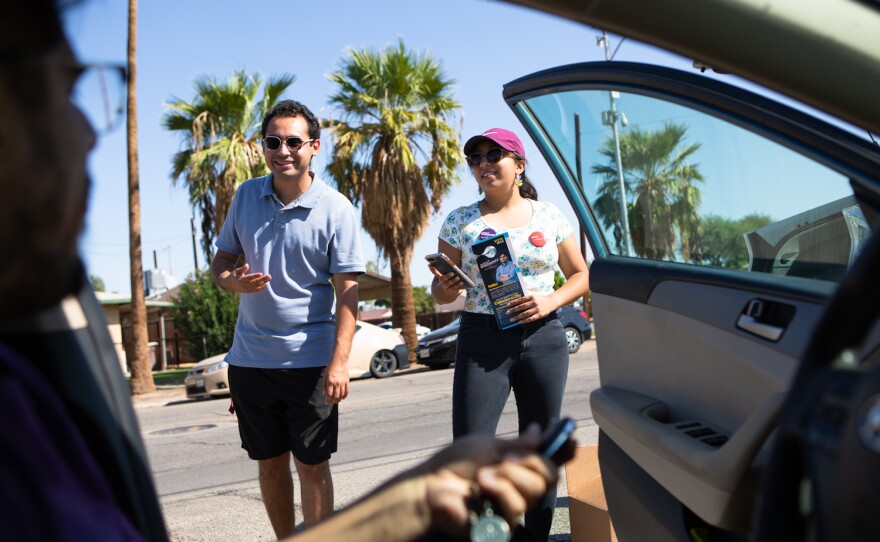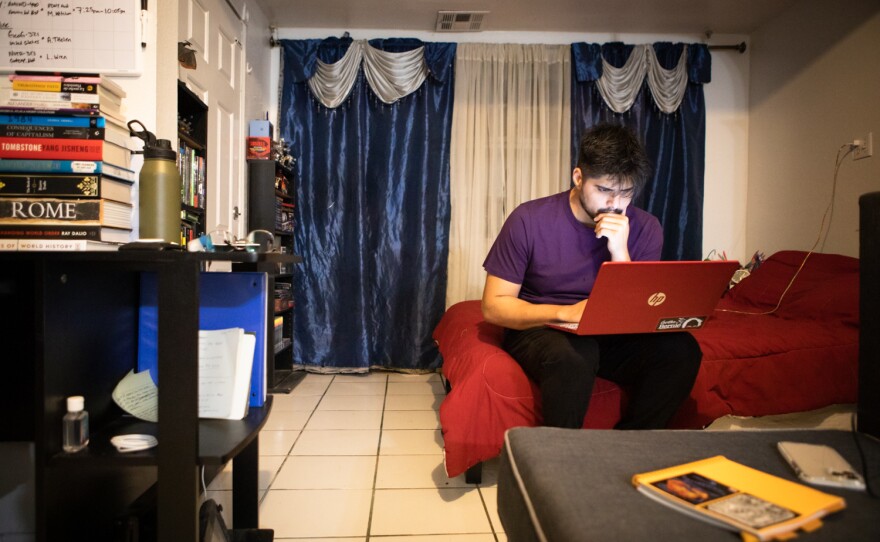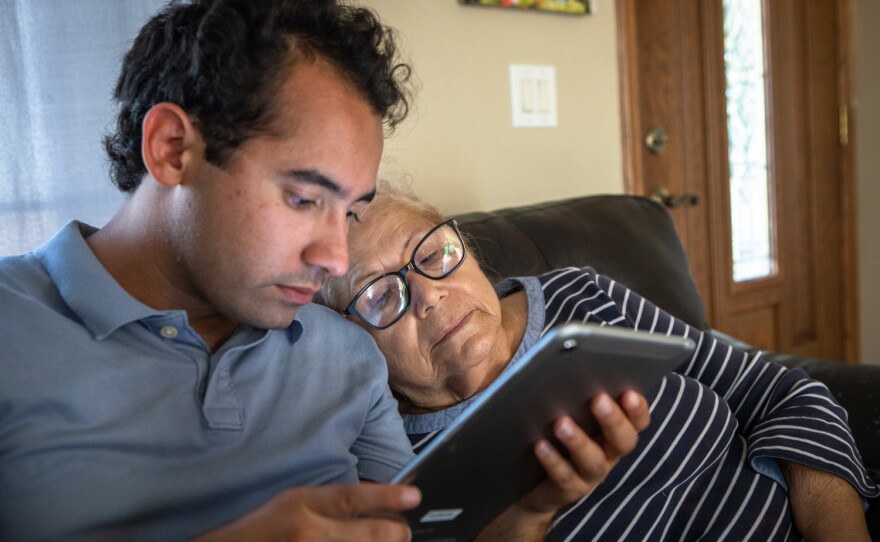This election season, there’s a new coalition of activists leaving their mark on politics in Calexico, a border city in California’s Imperial Valley. Helping to fuel the movement are young people, many who left Calexico for jobs or education elsewhere but who have returned home with a desire to make things better in their community.
Gilberto Manzanarez, 29, and Raúl Ureña, 25, are taking center stage in the effort. They came back to Calexico during the COVID-19 pandemic and quickly became involved in a growing grassroots movement of community advocates that included groups such as the Imperial Valley Equity and Justice Coalition and Calexico Needs Change. In 2020, Ureña, with the backing of fellow activists, won a seat on Calexico’s city council at the age of 23.
In this year’s election, seven candidates are competing to fill two seats on Calexico’s city council. Ureña and Manzanarez have largely campaigned as a team. They’ve pitched themselves as newcomers and changemakers, alternatives to other candidates who are older and some who have already served on or run for City Council before.
More information about all of the candidates can be found in this recent Calexico Chronicle article covering a campaign forum.
Daniela Flores, co-founder of the Imperial Valley Equity and Justice Coalition and a key supporter of Ureña and Manzanarez, says experiencing how other communities responded to the pandemic gave her and other activists, including the candidates she supports, a new perspective from which to demand change.
“We brought that lens back, and I think that’s what fueled our outrage at the beginning,” she said. “We had lived in other areas that were making different decisions centering public health, and it was still contentious in other places, but the fact is that it took so much for the county here to make the decisions that were best for the community and for their health.”

As it did across the nation, the pandemic brought long standing inequities in Imperial County sharply into view. Agriculture dominates the economy in the county, which means it’s home to many farmworkers who were deemed essential workers during the pandemic but who have also historically been plagued by low wages and barriers to accessing health care. The valley also ranks high for health indicators, including diabetes, obesity and asthma, that elevate COVID-19 risks.
Ureña says the pandemic also drove activists to form a community: “COVID brought us together in the defense of our community in a way that we knew that no one else was going to take care of it.”
Local corruption and mismanagement have also stymied improvements for residents. Nearly $900,000 in state funding to help farmworkers in Imperial County during the pandemic went unspent after federal investigators raided the county’s partner in the program. Federal pandemic money awarded to Calexico that could be used to help residents and small businesses remains frozen because of the city’s past grant compliance issues.
Ureña was elected in 2020 to a seat left open when former council member David Romero resigned over bribery charges. Romero and a former city official have since been convicted and sentenced to two years in prison for taking bribes in exchange for rapidly issuing a city permit for a cannabis business.
Once on council, Ureña quickly added a new dynamic to meetings, frequently vocalizing opposition and spearheading new proposals. Those actions sometimes led to fights breaking out among council members.
Efforts to reach Calexico City Councilmember Rosie Arreola-Fernandez, who like Ureña is seeking reelection, were unsuccessful.
Calexico City Council race
Seven candidates, including two incumbents, are competing for two seats on the Calexico City Council. They are:
Rosie Arreola-Fernandez, incumbent
Gerardo "Jerry" Espinoza
Bill Hodge
Gilberto Manzanarez
Blanca Morales
Morris Reisin
Raúl Ureña, incumbent
However, Calexico Mayor Javier Moreno said he embraces that younger people are running for office and encourages it, but also notes that with youth comes less life experience.
“When you’re young, you’re kind of like, anybody over 55 up there should be retired,” he said, laughing. “No. We have experience. We have a lot of experience.”
Both Manzanarez and Ureña “love Calexico, they’re from Calexico, both advocate for justice and social change, which I have no problem with,” said Moreno who also joined the council in 2020 but isn’t up for reelection until 2024. “I think we all want a better city.”
At the beginning of Ureña’s tenure on city council, however, the young councilmember’s lack of experience made it difficult for the council to work effectively and contributed to fighting, Moreno said. “You can’t just be, ‘I’m going to do it because I’m an activist and that’s the right thing to do.’ Well guess what? It doesn’t work that way,” he said. “You need to reach a consensus.”
Moreno says the atmosphere on council has improved since the first several months of the term and attributes some of that to his relationship with Ureña, whom he has encouraged to “tone it down.” Manzanarez is more mature and methodical when he appears before council, and his work in mental health allows him to speak with a “little more experience,” Moreno said.
As a leader of the group Calexico Union Against Corruption, Manzanarez has spoken during public comment at council meetings, frequently criticizing the city’s spending decisions. He was part of a coalition of activists that proposed an alternate budget for the use of federal pandemic relief. He says previous city councils have spent funds with little community input.
“It’s been just too many years of votes that nobody even knew were happening.”
Coming home
For Ureña the decision to move back to Calexico came during their final year as an undergraduate student at the University of California Santa Cruz. Ureña goes by they or other pronouns and has a non-binary gender identity. As a high school student, Ureña wanted to move as far away as possible. “I did not feel included because of my sexual orientation or my gender identity in my hometown, or even in my home,” they said.
At Santa Cruz, Ureña became actively involved in the graduate student strike on campus, which taught them about organizing but also left them disillusioned with the UC institution. They were homesick and in July 2020 moved home to finish the rest of their degree online, a new possibility during the pandemic. Now Ureña says they have a very strong relationship with their parents who “support me and celebrate me. That’s the greatest privilege of them all.”
In August of 2020, Ureña decided to run for a seat on the Calexico City Council, just days before the filing deadline. They campaigned on issues related to the pandemic response and won with 8,693 votes, or 71% of the total ballots cast.
Manzanarez was living in San Diego and working as a mental health care worker when the COVID-19 pandemic began. As an essential worker, he had to work in person. Manzanarez has severe asthma and was worried for his own health and safety. He recalls the shock at the time of noticing his hair was falling out.
“I thought I was going bald, but it was just the stress,” he said.
For months his parents encouraged him to leave his job and move back home, but at first he resisted. He liked the life he had worked hard to build in San Diego, and “it is hard to get out of Calexico,” he said. As the pandemic dragged on, he became more involved in the growing demands for change at home and saw the appeal of moving back and devoting himself fully to local activism.

In January 2021 he moved into a studio in the back of his parents home and now works as a mental health rehab tech for Imperial County Behavioral Health Services. He is also finishing his undergraduate degree at San Diego State’s Calexico campus.
‘Activism is in our DNA’
Manzanarez’s interest in politics started before the pandemic, during the 2016 presidential campaign. U.S. Sen. Bernie Sanders had a message that resonated with him.
“That’s what I’ve been thinking about for a couple of years now,” Manzanarez recalled thinking. “Like this guy’s saying it aloud. … Once you hear it, it’s kind of hard to just go back to sleep or ignore it.”
Part of that message is advocating for changes that would help workers and their families, which is rooted in his own family’s experience, he said.
Manzanarez grew up hearing stories from his grandfather, who lived and raised his family in Mexicali, but worked as a farmworker in the United States. His grandfather and uncle were survivors of a 1974 bus crash in Blythe, which killed 19 passengers as they were on their way to work. The tragedy sparked outrage from labor activists over the lack of oversight for safety measures in farm labor transport.
Manzanarez’s father, Gilberto Manzanarez Sr., says the crash left his father with nightmares for the rest of his life. He also traveled back and forth across the border for work, often without documentation, and by any means necessary: “by train, by canal, by desert – everything,” he added, “risking my life.”
As an adult, Manzanarez Sr. discovered that because his mother was born in Blythe, there was an easy pathway for him to become a citizen. Reflecting on the struggles and risks he took in the years before, he said, “vale la pena,” or “it was worth it.” “Because I got my own home, my family. … I’m rich.”
Ureña says they were also deeply inspired and shaped by the lives of their grandparents. “Activism is in our DNA,” they said, referring to themselves and other local activists. Both Ureña’s grandmother and grandfather were involved in the United Farm Workers labor movement.

Ureña shared a room with their grandfather in the last years of his life, something which their mother, Isabel Ureña, sees as having a large influence on her son. “Raúl was moved by all of the stories his grandfather told him, and I believe that motivated him even more to want to be how he is,” she said in Spanish.
From an early age, Raúl seemed destined for politics, as a teenager watching congressional debates and attending school board meetings to voice criticism of policies. She and her husband encouraged it.
Today, Isabel Ureña and Raúl’s father, Raúl Ureña Raggio, remain key supporters of their son’s political efforts. On a recent Saturday, Isabel, along with seven family members and friends, hosted a barbacoa plate fundraiser for both Ureña and Manzanarez. Ureña and Manzanarez’s parents are frequently out repairing campaign signs around the city or putting up new ones.
The two candidates have focused on walking the city’s residential streets to distribute flyers and talk to voters who they hope will turn out for them on Election Day. They embrace in person interactions, transitioning seamlessly between English and Spanish in conversations, and respond to concerns from crime to water rates.
Ureña emphasized that the activism in their family’s history is not unique to them.
“This community has a lot of that,” they explained. “Everybody has some kind of connection to Cesar Chavez.”
It’s something Ureña thinks political outsiders overlook.
“All those people look at my community and they’re like ‘uneducated, inactive, X, Y, Z’ and I’m like, you do not know the wealth, the wealth, of organizing ability in this community.”







